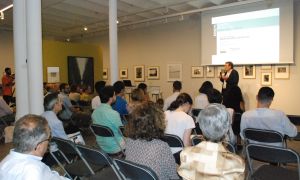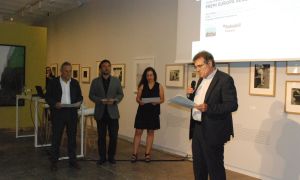The Catalunya Europa Foundation has awarded the 7th edition of the Europa Segle XXI Prize, from the Fundació Catalunya Europa and with the support of the Banco Sabadell Foundation. The winner of this edition has been Meritxell Parramon, a communication technician at the Delegation of the Generalitat in Brussels for her work The securitization of the management of asylum and refugee applications by the European Union in the face of the migratory crisis to starting in 2015. In this study, the winner talked about how the answers given by the European Union from 2015 to asylum applications have been insufficient, reinforcing the securitization trend of European immigration policy . In addition, a special mention was given to two works; Sustainable EU Corporate Law for Sustainable Development: an Interdisciplinary View, from the professor of the Department of Civil Law of the UPF, Lela Mélon and Paths of Robotization: Robotization according to Varieties of Capitalism, by Bernat Aritz Monge, doctoral student at the Institute European University of Florence.
The delivery ceremony took place at the Fundació Foto Colectania and was moderated by Francesc Colomé, secretary of the jury of the prize and member of the Fundació Catalunya Europa; Miquel Molins, president of the Banco Sabadell Foundation, Elisabeth Zapata, distinguished technologist from HP and member of the jury, and Max Vives-Fierro, executive director of the FCE who delivered the prize to the winners.
The winner spoke about the migratory pressure experienced during the year 2015, produced by the so-called 'Mediterranean Crisis', which caused the arrival of historical records (in number of asylum claims), the reason for which Parramon wanted to ask what had been the answer from the EU. The objective of his work, said the winner, is to understand the process of adopting certain measures by the EU, observing the evolution of the speeches (or positions) of the main EU leaders. The speaker completed his speech exposing the conclusions of the work. 'The Mediterranean crisis' has shown that, although the Schengen Agreement has been working to create a common European migration policy, many decisions related to migration continue to be taken at national level, despite the fact that the attempt to harmonize the established instruments. The author argues that this crisis has opened a "new scenario of migration opportunities, especially asylum and refuge, a topic that has become a priority on the European political agenda since 2015 and has shown the need for" Greater integration if it really strives for a stronger Union. "
On the other hand, Léla Melon presented his work on sustainable development of European corporate laws. He stressed that current legal corporations need to find solutions to the problems of the social and environmental impacts of current production systems. He placed the focus on the European Union, a key player in the implementation of the necessary measures to achieve sustainable and long-term sustainable development.
Finally, Bernat A. Monge presented his document Paths of Robotization: Robotization according to Varieties of Capitalism, a work whose main objective is to demystify the fact that robotization is necessarily associated with a loss of jobs. According to this study, robotization increases the benefits and in many advanced countries has been the key piece of labor stability and has allowed for competitiveness at the international level.
The ceremony was closed by the vice-president of the Fundació Catalunya Europa, Josep Maria Vallès, Emeritus Professor of Political Science and the Administration of the UAB. He said that this prize is an opportunity to create a debate around the idea of ??Europe. "A Europe that seems increasingly losing its legitimacy to European citizens." He closed his speech expressing the trust in the new generations that adopted essential perspectives and critics for the European debate, since they can have a real impact and therefore they must be disseminated and made them conform to new lines of current thinking.
The "Catalunya Europa XXI" Award recognizes the works that have an original analytical approach, aimed at knowing and understanding the future of Europe and its governance in a globalized and interdependent world. The objective is to promote research on key challenges for Europe, as well as generate new ideas and proposals.















